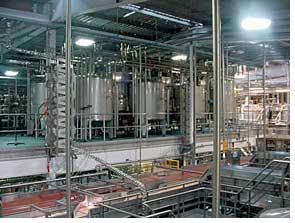
A combination of grades 304 and 316L stainless steel has been utilised for all contact surfaces in Murray Goulburn's milk processing plant in Rochester, Victoria, which was upgraded in 2000.
The plant comprises an evaporator to concentrate cow's milk and spray dryer to produce various milk powders. Approximately 100 000 litres of milk is processed per hour, with the majority of product for export to over 100 countries. The evaporator and dryer represent more than half of the total project, a capital investment of around A$50 million.
The stainless surfaces and components carry milk feed, evaporated vapour, milk concentrate, milk powder, hot drying gas and cleaning chemicals of alkali and acid.
 All product contact surfaces are of austenitic stainless steel grade AISI 304, with the 12m long evaporator tubes being produced from strip then rolled with the seam welded and bead rolled; the tubes have a 2B internal finish.
All product contact surfaces are of austenitic stainless steel grade AISI 304, with the 12m long evaporator tubes being produced from strip then rolled with the seam welded and bead rolled; the tubes have a 2B internal finish.
Principal contractor Niro Australia received instructions to proceed in July 1999 and conducted the first powder trials 14 months later, with commercial production starting November 2000.
To carry out the project, Niro involved Victorian fabricators Stainless Technology and PLC Engineering, though some fabrication was also conducted in New Zealand.
ASSDA member Alfa Laval supplied food grade stainless steel pumps, process valves, tank equipment, fittings and tubing worth over $2.5 million. The total supply was in excess of 40 tonnes and included 40km of tubing in sizes 1" to 6".
Grade 316L stainless steel was used for wetted parts (parts in contact with process fluids) and 304 for non-wetted areas. Products were generally supplied with a no.4 external surface finish; AS 1528 was used as the guideline for component standards.
Many of the process pumps and valves were chosen for their product handling characteristics. Specialist mixproof valves, which allow two different products to travel through the same valve without fear of intermixing, and high efficiency pumps were selected. Spillage-free mixproof valves were specified to prevent accidental discharge onto process floors and ensure a clean process environment, and rotary lobe pumps were selected for their gentle handling of cream products.
Pre-fabrication of many of the valve and pipework assemblies was carried out off-site in controlled environments. Due to the critical nature of the process applications, importance was placed on welding techniques and subsequent cleaning of welds. Valve manifolds were pre-fabricated and transported to site on completion, minimising the number of critical welds performed on site.
TOMATO PROCESSING
Fifty thousand tonnes of tomatoes have passed through Ardmona's processing plant in Mooroopna, Victoria, since it began operation a year ago.
The $15 million plant, which produces whole peeled and crushed tomatoes, was constructed entirely in stainless steel using grade 304 for the structural components and 316 tube and fittings for the wetted parts. Stainless steel was specified for its corrosion resistance and low maintenance, and to meet the health and safety requirements of a food processing plant.
Designed with a life expectancy of 30 years, the plant is capable of processing 40 tonnes of tomatoes per hour.
Ardmona's Engineering and Production Department, in conjunction with Italian firm Sasib Foods, were responsible for the design, engineering and construction aspects of the nine-month installation.
This article featured in Australian Stainless magazine - Issue 20, February 2002.